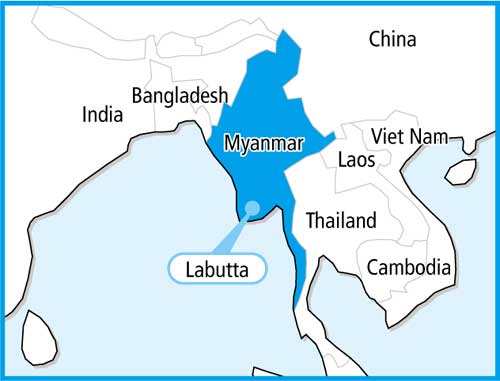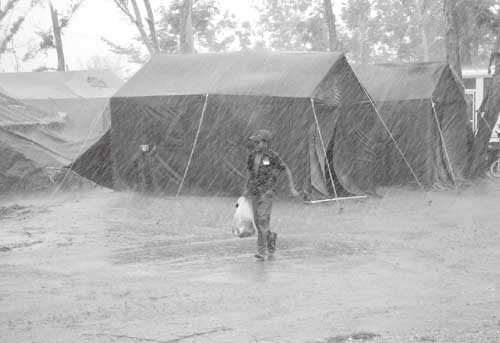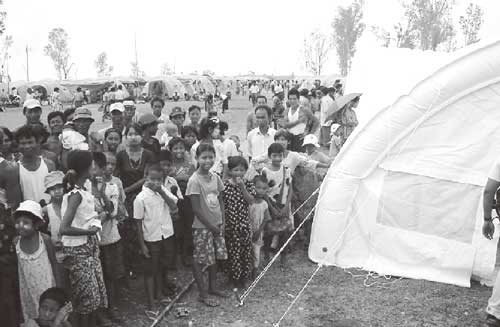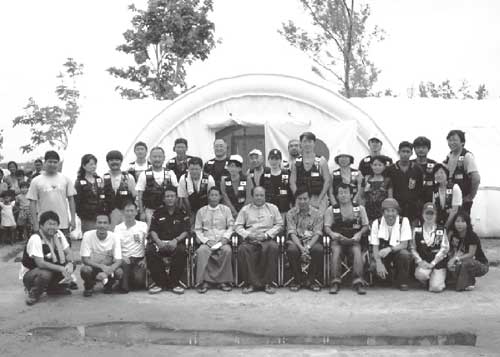Japan's Official Development Assistance White Paper 2008
On May 2-3 2008, a major cyclone hit the southern coast of Myanmar, resulting in the death or disappearance of approximately 140,000 people and damage on the scale of approximately US$10.6 billion. Having received a request from the Government of Myanmar, the Government of Japan dispatched the Japan Disaster Relief Medical Team of 23 members, as well as providing emergency grant aid. The members of Team consisted of four medical doctors (including the team leader), seven nurses (including one midwife), six medical coordinators (including a pharmacist, two medical laboratory technicians, a radiological technician, a nutritionist, and an emergency life-saving technician), and six logistical coordinators (including a team sub-leader from the Ministry of Foreign Affairs). The team's operation has been highly appreciated with its work on traumas caused by the disaster, diarrhea, malaria, and dengue fever, etc. Dr. Kaname KANAI, who has been making great efforts as the team leader, spoke with us about the medical activities in Myanmar and lifestyle aspects of the work undertaken by the people on the medical team.
Dr. Kaname KANAI
Team Leader, Japan Disaster Relief Medical Team, dispatched to Myanmar
Principal, Emergency Life-Saving Technique Academy of Kyushu (Contributor)


A medical examination (from right to left: Dr. Kanai, the medical team leader; Mr. Sonny, an interpreter; a patient) (Source: JICA)
On May 25, I left Japan for Myanmar to gather information from related organizations for conducting a preliminary study, but I was barely able to collect it sufficiently. In the afternoon of May 27, prior to departure for Labutta, I asked an officer at the Myanmarese Ministry of Health about Labutta, — the site where the dispatch was planned. There, I was casually told "There are no problems with security, but there's no accommodation. We cannot guarantee the safety of drinking water and food; Soon it will be rainy season, there will be a lot of mosquitoes; You need mosquito nets to avoid a risk to be infected with malaria." and finally, "There's no electricity, so I guess you'll be staying in tents." All this implicitly suggested how hard this assignment was going to be. In spite of our anxiety, I managed to negotiate a roofed accommodation for the team with camp beds packed tightly inside, after we arrived in Labutta, indeed.
It was in the evening of May 30 that the team arrived in Labutta, a township in Myanmar's southern delta, which had suffered from the cyclone devastatingly. In the morning of the next day, May 31, we set up medical tents in one of the camps for disaster affected people, where approximately 6,400 displaced people stayed temporarily. We began our medical examinations in the afternoon of the same day. Under the brilliantly blue sky in the tropical dry season, the temperature reached 38 degrees Celsius in the morning, the coolest time of the day. It easily went over 40 degrees Celsius during the day time. With very little fresh air, the temperature in our medical tents was even higher than the outside. This caused us to feel our physical strength taken away. It was in this tough natural condition that we carried out our missions.

A camp for disaster affected people in torrential rain during the rainy season (Source: JICA)
During our mission, everyday we examined between 110 and 170 patients who suffered from a variety of ailments including diarrhea, dehydration, colds, skin complaints, and traumas. The medical examinations took place with limited numbers of personnel and equipment. The team's fame had apparently spread throughout the Labutta region. For instance, we saw a female patient who walked all the way from her village, where she left at 5:00 AM.
For those who imagine that everyone on a medical team is a doctor or a nurse, the number of logistical coordinators seems too many. For operating the mission successfully, it is inevitable to re-direct 3.5 tons of a burden, arrange over 40 staff including interpreters and chauffeurs instantly, and hire ten vehicles such as buses and trucks. Subsequently, loading all the burden and people must be successfully carried out. On top of that, immediately after reaching the venue, various operations must be needed; unloading the necessary equipment, establishing medical tents, and setting up our accommodations. Managing all of the above duties cannot be achieved successfully without leadership by logistical coordinators, with their highly accumulated knowledge and experience. Pushing our mission forward and taking off smoothly, surely relies on their abilities.
During our stay, we obtained drinking water in Yangon, and kept eating preserved food such as instant rice, noodles, and canned foods, bought from Japan and acquired in Yangon. It was fairly tough to eat dried foods reconstituted with hot water, boil-in-the-bag foods, and canned foods everyday. I got a real sense of how "health management starts with the food you eat." Food is linked with the team's health and morale. This moment was when the coordinators can display their full abilities. While the medical personnel carried out examinations, the logistical coordinators arranged items we needed, including water and food. Whenever I took a mouthful of drink cooled by ice, acquired by them, somewhere, I felt it was like a little piece of civilized life given back to me.

The medical examination camp and the disaster affected people (Source: JICA)
About a week after we started our missions, they made some vegetable soup for the team members. This severe natural environment was taking quite a heavy physical toll on us, and some of us even began to lose balance of physical conditions. In such time, the soup with cooked cabbage and potatoes tasted so delicious, that the members were all impressed by their special task.
We examined a total of 1,202 people during a nine-day period that ended in the morning of June 8. Our logistical coordinators unquestionably played an important role for smooth operations as they ran back and forth on various tasks. When we withdrew from the camp, the mother of a child, whom we had diagnosed with severe malaria and died after being taken to a local hospital, came out to see us off to show her gratitude for our team's good faith.

Group photograph after the delivery ceremony (June 8) (Source: JICA)


 Next Page
Next Page